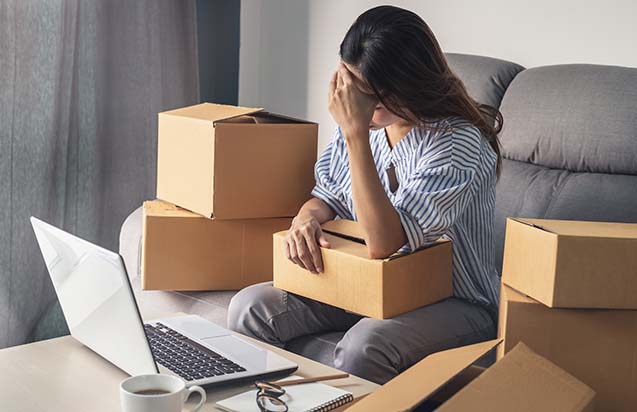WHAT TO DO IF YOUR HOME ISN'T SELLING
Home selling Hiccups and their Remedies
A house can easily become a home over the course of time when it’s lived in and turned into one. In the process of building a home, you become a part of it. Therefore, when it doesn’t sell, it can be frustrating.
A home that doesn’t sell doesn’t mean it’s bad to live in. Market conditions and local inventory are just a few of the factors that can make homes difficult to sell.
Fortunately, you can control some things. You shouldn’t worry if you make one (or more) of these easy-to-make mistakes when selling your home. You can overcome these obstacles in a number of ways.
There is a problem with the price
Almost every real estate professional we spoke with agreed that overpriced houses are the most common reason they don’t sell.
Particularly for sellers without an agent, this can be a problem. The art of correctly pricing a house for sale is the domain of experienced agents. As well as determining how much a house will sell for, they have access to resources to assist them.
Homeowners rarely have access to the tools and data real estate agents do, so they rely on Zillow or other websites to estimate their home value, which is often inaccurate.
Home sales data is readily available for your region, so real estate professionals can see what’s being listed at homes similar to yours, as well as what they’re selling for.

How To Deal With It
It is essential that you price your home the way a professional would if you are not working with one. Rather than estimating a house’s value and how much you would like to profit from it, look at local data instead.
Using what professionals call “comps” – comparable sales – will give you a better idea of the market. In a comp, you are looking for recent sales of similar homes, ideally within the last six months. Comparable houses should be located in close proximity to yours. Despite being one block away, a house one block over is likely to sell for a higher price if it is on a busy street while yours is on a quiet one. A comp should also have the same number of bedrooms and bathrooms as the original, as well as a similar layout.
If you want to get an estimate of what your home is worth based on the average rate of appreciation for homes in your area, you may be able to find useful home value information by visiting your municipality’s tax inspector’s office or using the Federal Housing Finance Agency’s House Price Calculator. Setting an asking price for your home will be easier once you’ve done your research.
Choosing the right price is very important, as overpricing may be difficult to recover from, even if you end up reducing it. If your home is overpriced, it may end up sitting on the market for a longer period of time than is normal in your area. As a result, selling becomes even more difficult. In cases where a home has been on the market for a long time or has been reduced in price several times, buyers may be wondering if something is wrong, and you may only receive offers even lower than your reduced price.
You're too attached to your house
Overpricing or not being open to negotiation can lead to lots of problems when you are too precious about your home.
In some cases, such as a water-stained ceiling, or a cracked light switch, these defects can go unnoticed. A buyer, however, notices everything, Rose said.
Your home likely has quirks or minor annoyances that are red flags for a buyer when you’re used to them. Even though you might place a lot of emotional value on renovations you put a lot of time and money into, this doesn’t automatically translate into a higher home value. It is important to overcome these obstacles so that you are able to look at your house as a real estate agent would and not take it personally if someone offers you less than what you think it is worth.
How To Deal With It
Observe objectively. As an individual, you have to act as your own businessperson without a real estate agent. Keeping your home in mind should not override your decision-making process.
Bring in a third party who can point out things you may not notice since you don’t have a real estate agent to point them out. Someone who doesn’t spend a lot of time in your house may be able to give you a different perspective.
Showing your home can be a stressful experience, so be willing to listen to your viewers’ feedback. When negotiating, don’t let emotions get in the way.

Marketing is limited
Real estate agents reported this as another major issue. Real estate agents spend a lot of time marketing the homes they’re trying to sell, which amateurs don’t realize. The most common mistake I see when showing for sale by owner properties to my clients is inadequate marketing. Many of the photos would be dark or contain lots of personal items.
Your house is worthless if no one knows it’s for sale. You’re going to have a hard time attracting buyers if your home doesn’t have a strong online presence in an era when 44% of buyers begin their search online. Most agents not only list homes on MLS, but also discuss the homes with their colleagues, post about them on social media, host open houses, and market them to other agents with qualified buyers.
How To Deal With It
Make sure you advertise your home as widely as possible. As many people as possible should be able to see it.
Ensure that your home is attractive to buyers when they first see it. Having high-quality pictures is essential.
It is important that your pictures are of professional quality. Taking the photos yourself may be possible if you have a good camera and a decent understanding of real estate photography (make sure the room is well-lit, remove clutter, and use sharp, focused photographs). Make sure your smartphone camera is high-quality if you want to take pictures, and don’t use your phone camera to capture them.

There's no MLS listing for you
Your home will be seen by buyers only if you list it on the MLS. It is possible to view houses for sale in a particular area using multiple listing services, or MLSs.
When you’re not on the MLS, you’re not getting exposure where it counts. A real estate agent searches the MLS database to find houses that are for sale in the area where they need to show them to their clients. The likelihood of serious buyers seeing your home drops if it is not listed on it.
How To Deal With It
A licensed real estate agent is the only one who has access to the MLS databases, so if you want your home listed there, you’ll need to work with them. It is likely to cost you money.
A flat-fee MLS listing service should be sought from a broker. You can have your home listed on the MLS by a licensed real estate broker for a one-time fee.
You're not giving it enough time
While selling your home is a full-time job, it’s possible you’re not giving it the attention it deserves if you’re also working full-time.
It’s unlikely that you will be able to let people into your home last minute during the middle of the day, even if an agent is available. This is a common problem with for-sale-by-owner homes.
You’re making it difficult for buyers to buy if you can’t show during the day while you’re at work or leave town on the weekends to avoid doing open houses.
How To Deal With It
Be honest with yourself before deciding to sell your own home. Do you have the time to sell your own home?
Choose a time when work won’t be busy and no big vacations are planned. Weekends should be available to you. Ensure that your home is easy to visit for buyers.


Help is needed
Your main goal may be to save money by selling your home yourself, so you may not like the idea of calling in a professional. Occasionally, you may have to ask someone who works in this field for help when you’re completely out of your element.
How To Deal With It
The above problems might make sense to discuss with a professional if you struggle to overcome them. An appraiser can give you a professional opinion about your home’s value if you’re having trouble determining how to price your home.
If you are having trouble pricing your home, depending on your photography skills, a local professional photographer is highly recommended.
Identify the issue
In some cases, you don’t know why your home isn’t selling, and you don’t know why that is. What is the cause of your problem? Keep an eye out for potential buyers backing out at what point in the process they do so.
It’s helpful for homeowners to think about this rule of thumb: If a house is getting a lot of showings but no offers, it’s likely the marketing is working and the home looks appealing, but the price may be too high. The most common reason for a home not getting showings is that it doesn’t look compelling enough to attract buyers.
You will face some unique obstacles simply because you are selling your house yourself. A buyer who works with an agent who is wary of independent sellers can make it harder to get them to look at your house at all.
It is possible, however, to increase the odds of selling your home for what it’s worth by preparing for the obstacles listed above, conducting research, and showing potential buyers and their agents that you know what you’re doing while being as professional as possible.
